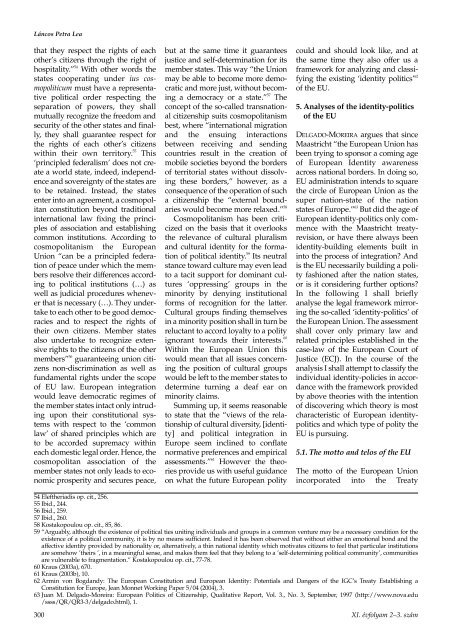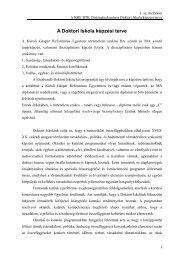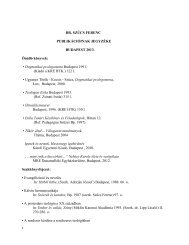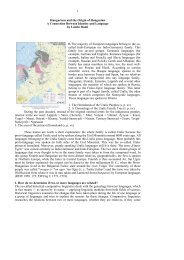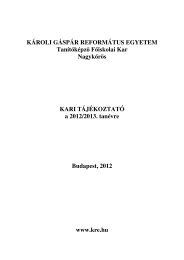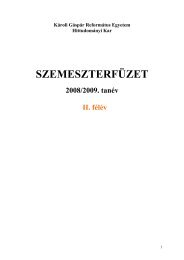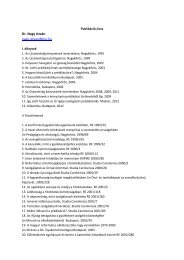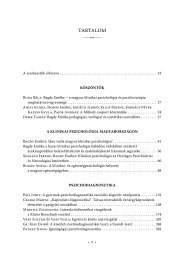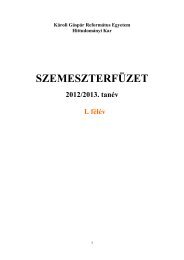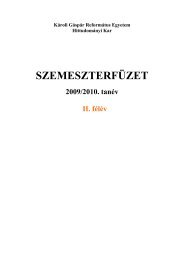collega - Károli Gáspár Református Egyetem
collega - Károli Gáspár Református Egyetem
collega - Károli Gáspár Református Egyetem
You also want an ePaper? Increase the reach of your titles
YUMPU automatically turns print PDFs into web optimized ePapers that Google loves.
Láncos Petra Lea<br />
that they respect the rights of each<br />
other’s citizens through the right of<br />
hospitality.” 54<br />
With other words the<br />
states cooperating under ius cosmopoliticum<br />
must have a representative<br />
political order respecting the<br />
separation of powers, they shall<br />
mutually recognize the freedom and<br />
security of the other states and finally,<br />
they shall guarantee respect for<br />
the rights of each other’s citizens<br />
within their own territory. 55<br />
This<br />
‘principled federalism’ does not create<br />
a world state, indeed, independence<br />
and sovereignty of the states are<br />
to be retained. Instead, the states<br />
enter into an agreement, a cosmopolitan<br />
constitution beyond traditional<br />
international law fixing the principles<br />
of association and establishing<br />
common institutions. According to<br />
cosmopolitanism the European<br />
Union “can be a principled federation<br />
of peace under which the members<br />
resolve their differences according<br />
to political institutions (…) as<br />
well as judicial procedures whenever<br />
that is necessary (…). They undertake<br />
to each other to be good democracies<br />
and to respect the rights of<br />
their own citizens. Member states<br />
also undertake to recognize extensive<br />
rights to the citizens of the other<br />
members” 56 guaranteeing union citizens<br />
non-discrimination as well as<br />
fundamental rights under the scope<br />
of EU law. European integration<br />
would leave democratic regimes of<br />
the member states intact only intruding<br />
upon their constitutional systems<br />
with respect to the ‘common<br />
law’ of shared principles which are<br />
to be accorded supremacy within<br />
each domestic legal order. Hence, the<br />
cosmopolitan association of the<br />
member states not only leads to economic<br />
prosperity and secures peace,<br />
but at the same time it guarantees<br />
justice and self-determination for its<br />
member states. This way “the Union<br />
may be able to become more democratic<br />
and more just, without becoming<br />
a democracy or a state.” 57<br />
The<br />
concept of the so-called transnational<br />
citizenship suits cosmopolitanism<br />
best, where “international migration<br />
and the ensuing interactions<br />
between receiving and sending<br />
countries result in the creation of<br />
mobile societies beyond the borders<br />
of territorial states without dissolving<br />
these borders,” however, as a<br />
consequence of the operation of such<br />
a citizenship the “external boundaries<br />
would become more relaxed.” 58<br />
Cosmopolitanism has been criticized<br />
on the basis that it overlooks<br />
the relevance of cultural pluralism<br />
and cultural identity for the formation<br />
of political identity. 59 Its neutral<br />
stance toward culture may even lead<br />
to a tacit support for dominant cultures<br />
‘oppressing’ groups in the<br />
minority by denying institutional<br />
forms of recognition for the latter.<br />
Cultural groups finding themselves<br />
in a minority position shall in turn be<br />
reluctant to accord loyalty to a polity<br />
ignorant towards their interests. 60<br />
Within the European Union this<br />
would mean that all issues concerning<br />
the position of cultural groups<br />
would be left to the member states to<br />
determine turning a deaf ear on<br />
minority claims.<br />
Summing up, it seems reasonable<br />
to state that the “views of the relationship<br />
of cultural diversity, [identity]<br />
and political integration in<br />
Europe seem inclined to conflate<br />
normative preferences and empirical<br />
assessments.” 61<br />
However the theories<br />
provide us with useful guidance<br />
on what the future European polity<br />
could and should look like, and at<br />
the same time they also offer us a<br />
framework for analyzing and classifying<br />
the existing ‘identity politics’ 62<br />
of the EU.<br />
5. Analyses of the identity-politics<br />
of the EU<br />
DELGADO-MOREIRA argues that since<br />
Maastricht “the European Union has<br />
been trying to sponsor a coming age<br />
of European Identity awareness<br />
across national borders. In doing so,<br />
EU administration intends to square<br />
the circle of European Union as the<br />
super nation-state of the nation<br />
states of Europe.” 63 But did the age of<br />
European identity-politics only commence<br />
with the Maastricht treatyrevision,<br />
or have there always been<br />
identity-building elements built in<br />
into the process of integration? And<br />
is the EU necessarily building a polity<br />
fashioned after the nation states,<br />
or is it considering further options?<br />
In the following I shall briefly<br />
analyse the legal framework mirroring<br />
the so-called ‘identity-politics’ of<br />
the European Union. The assessment<br />
shall cover only primary law and<br />
related principles established in the<br />
case-law of the European Court of<br />
Justice (ECJ). In the course of the<br />
analysis I shall attempt to classify the<br />
individual identity-policies in accordance<br />
with the framework provided<br />
by above theories with the intention<br />
of discovering which theory is most<br />
characteristic of European identitypolitics<br />
and which type of polity the<br />
EU is pursuing.<br />
5.1. The motto and telos of the EU<br />
The motto of the European Union<br />
incorporated into the Treaty<br />
54 Eleftheriadis op. cit., 256.<br />
55 Ibid., 244.<br />
56 Ibid., 259.<br />
57 Ibid., 260.<br />
58 Kostakopoulou op. cit., 85, 86.<br />
59 “Arguably, although the existence of political ties uniting individuals and groups in a common venture may be a necessary condition for the<br />
existence of a political community, it is by no means sufficient. Indeed it has been observed that without either an emotional bond and the<br />
affective identity provided by nationality or, alternatively, a thin national identity which motivates citizens to feel that particular institutions<br />
are somehow ’theirs ’, in a meaningful sense, and makes them feel that they belong to a ’self-determining political community’, communities<br />
are vulnerable to fragmentation.” Kostakopoulou op. cit., 77-78.<br />
60 Kraus (2003a), 670.<br />
61 Kraus (2003b), 10.<br />
62 Armin von Bogdandy: The European Constitution and European Identity: Potentials and Dangers of the IGC’s Treaty Establishing a<br />
Constitution for Europe, Jean Monnet Working Paper 5/04 (2004), 3.<br />
63 Juan M. Delgado-Moreira: European Politics of Citizenship, Qualitative Report, Vol. 3., No. 3, September, 1997 (http://www.nova.edu<br />
/ssss/QR/QR3-3/delgado.html), 1.<br />
300 XI. évfolyam 2–3. szám


